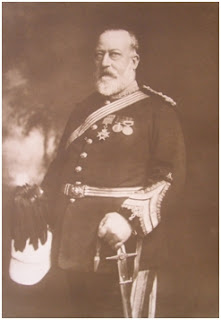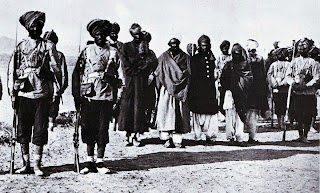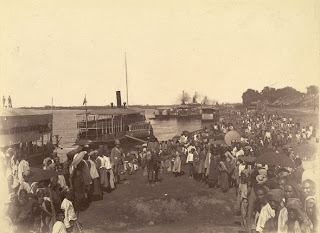Surgeon-General Charles Sibthorpe
 |
| VM/1/2/S/10 - Charles Sibthorpe |
Charles Sibthorpe was born in Dublin in 1847, he studied medicine at the Royal College of Surgeons in Ireland and at the Meath Hospital. In 1870 he joined the Indian Medical Service as Assistant-Surgeon. Following some years of official work in the civilian and military departments, he was appointed Civil Surgeon and Superintendent of the Gaol at Banda, in the Central Provinces (Uttra Pradesh). In 1875 Sibthorpe was transferred to Madras (now Chennai) and appointed Resident Surgeon to the General Hospital and Professor of Pathology at the Madras Medical College. Established in 1835 the Madras Medical College is the oldest medical college in India. It was attached to the General Hospital which had been founded in 1664, and the two were used as an example of how medical care and education should be provided in India.
 |
| Madras, c.1880s |
Sibthorpe remained at the College and Hopsital in Madras until 1890, serving successively as Professor of Pathology, Opthalmology, Anatomy and Surgery. In 1894 he was appointed Surgeon-General with the Government of Madras, a post he held until 1900.Twice during his time in India Sibthorpe volunteered for actice service with the Indian Medical Service. In 1878 he served with the Peshawar Valley Field Forces in Afganistan and in 1885 he saw active service in Burma and staff surgeon to Sir Harry Prendergast (1834-1913), the officer in command of the British foces in Upper Burma.
 |
| Peshwar Vally Field Forces, Afganistan 1878 |
 |
| British Forces in Burma, 1885 |
As with many who served with the British in India, Sibthorpe's health was damaged by his service. In August 1900 he returned from the India Medical Service and returned to Dublin, where he lived with his unmarried sisters. Plagued by ill health he died in 1906, at the age of only 59. Despite spending the majority of his working life in India, Sibthorpe retained close ties with Ireland, and his contributions to medicine were recognised by the King and Queen's College of Physicians in Ireland in 1880 when he was elected a Fellow of the College. In 1897 his contribution to the British forces in India recived greater recognition when he was made a Companion of the Order of the Bath.
But why the sudden interest in Charles Sibthorpe? Well, over the last number of weeks I have been cataloguing a number of small collections and individual bound items, which have been donated to the College archive. These include a range of items such as case books, lecture notes and manucript essays. Amongst these items was a series of case books from hospitals in India, althought it was known they were held by the archive there was no additional information about where they had come from or who has written them.
 |
| Page from Case Book, CS/2 |
During cataloguing I found a number of copy letters in one of the case books, which indicated that they might have belong to doctor named Sibthorpe. Recognising the name from a portrait of him which hangs in the College, I looked up his service record and found that it matched the dates, locations and case types covered by the case books. In addition Sibthorpe was the only Fellow of the College practicing in Madras at the time. The portait of Sibthorpe which hangs in the College, as well as several books in Dun's Library, were presented by Sibthorpe's sisters following his death, and it seems likely that, either at the same time or slightly after, they also presented his case books.